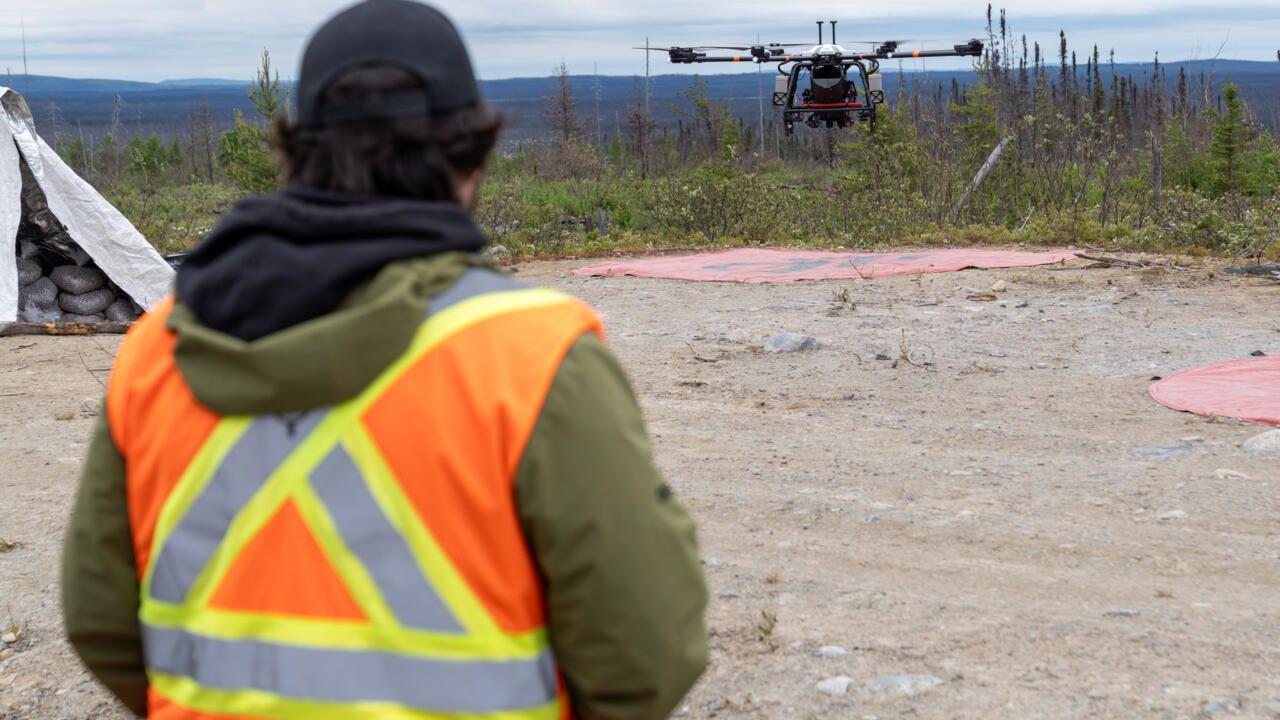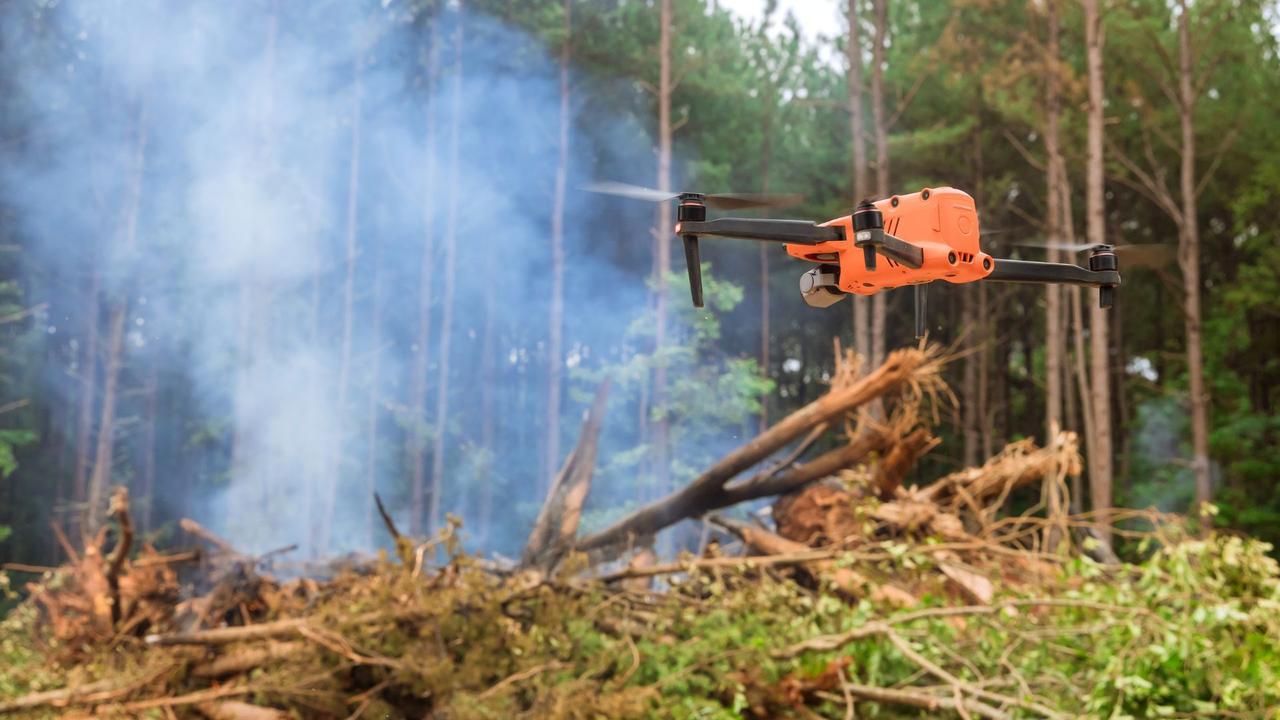Canada Deploys AI-Powered Drones for Reforestation After Record Wildfires
2 Sources
2 Sources
[1]
Canada turns to drones for reforestation after wildfires
A large aerial drone flies over the charred remains of Canadian forests devastated by wildfires, bombarding the ground with seed capsules to accelerate reforestation. This area of northern Quebec province was ravaged by megafires in the summer of 2023 and for the second year in a row a pilot project has been using drones to plant new black spruces and jack pines. Rather than simply dropping seeds from high above, the company Flash Forest, which is leading the initiative, uses seeds protected in capsules that also contain water and nutrients, as well as fungi, to maximize their growing potential. "There is a niche that's appropriate for drone reforestation which we've spent the last five years narrowing in on," Flash Forest cofounder Cameron Jones explained. The company focuses its efforts on forests that were scorched in the last year or two and excludes older burn sites that already have vegetation that can crowd out new seeds. 50,000 capsules per day It is no longer feasible to wait for Canada's forests to bounce back all on their own with millions of hectares of forests destroyed each year. In 2023, Canada experienced a record year of wildfires with blazes affecting every province, ultimately burning nearly 18 million hectares (44 million acres). Quebec, and particularly this area in the north of the French-speaking province, was hit especially hard that year. Drone operator and geospatial data scientist Owen Lucas says the method uses artificial intelligence to map out the sites ahead of time. "Then we pick our sites based on climate variables, physical attributes, topographic variables, to make sure we're putting the seeds in the right place," he said, his eyes fixed on the drone's remote controls. The company also has projects in another Canadian province, Alberta, and in Colorado in the United States. Each drone can deliver seeds to plant 50,000 trees per day. "When you're out here planting you don't see the impact, but when you come back in the fall and you see them growing, you know you're doing a positive thing," Lucas said. In 2023, like this year, which has already seen more than 4.2 million hectares burned across the country, megafires are being fueled by drought, which experts say is linked to global warming. "It's sad to have lost so much forest," lamented Angel Mianscum, one of the Indigenous leaders of a nearby Cree community. She was, however, pleased to see there are now "innovative ways of doing things." The Cree community has worked directly with Flash Forest to plan the local reforestation. Indigenous communities are the most affected by fires in Canada because they are often remote and deep in the boreal forest. Seed shortage "We are increasingly forced to reforest in Canada. Boreal forest trees are adapted to fires, but today the conditions are becoming more complicated," said Maxence Martin, professor of forest ecology at the University of Quebec in Abitibi-Temiscamingue. He points out that in 2023, for example, very young forests burned. "If the forest is too young, it will take a very long time to start regenerating, so planting is the only option." While the use of drones can help reach certain areas more quickly, it also has its downsides: many seeds end up wasted. "And today there is a seed problem because they are complicated to harvest," and therefore Canada is short of them, Martin said.
[2]
Canada turns to drones for reforestation after wildfires
Chibougamau (Canada) (AFP) - A large aerial drone flies over the charred remains of Canadian forests devastated by wildfires, bombarding the ground with seed capsules to accelerate reforestation. This area of northern Quebec province was ravaged by megafires in the summer of 2023 and for the second year in a row a pilot project has been using drones to plant new black spruces and jack pines. Rather than simply dropping seeds from high above, the company Flash Forest, which is leading the initiative, uses seeds protected in capsules that also contain water and nutrients, as well as fungi, to maximize their growing potential. "There is a niche that's appropriate for drone reforestation which we've spent the last five years narrowing in on," Flash Forest cofounder Cameron Jones explained. The company focuses its efforts on forests that were scorched in the last year or two and excludes older burn sites that already have vegetation that can crowd out new seeds. 50,000 capsules per day It is no longer feasible to wait for Canada's forests to bounce back all on their own with millions of hectares of forests destroyed each year. In 2023, Canada experienced a record year of wildfires with blazes affecting every province, ultimately burning nearly 18 million hectares (44 million acres). Quebec, and particularly this area in the north of the French-speaking province, was hit especially hard that year. Drone operator and geospatial data scientist Owen Lucas says the method uses artificial intelligence to map out the sites ahead of time. "Then we pick our sites based on climate variables, physical attributes, topographic variables, to make sure we're putting the seeds in the right place," he said, his eyes fixed on the drone's remote controls. The company also has projects in another Canadian province, Alberta, and in Colorado in the United States. Each drone can deliver seeds to plant 50,000 trees per day. "When you're out here planting you don't see the impact, but when you come back in the fall and you see them growing, you know you're doing a positive thing," Lucas said. In 2023, like this year, which has already seen more than 4.2 million hectares burned across the country, megafires are being fueled by drought, which experts say is linked to global warming. "It's sad to have lost so much forest," lamented Angel Mianscum, one of the Indigenous leaders of a nearby Cree community. She was, however, pleased to see there are now "innovative ways of doing things." The Cree community has worked directly with Flash Forest to plan the local reforestation. Indigenous communities are the most affected by fires in Canada because they are often remote and deep in the boreal forest. Seed shortage "We are increasingly forced to reforest in Canada. Boreal forest trees are adapted to fires, but today the conditions are becoming more complicated," said Maxence Martin, professor of forest ecology at the University of Quebec in Abitibi-Temiscamingue. He points out that in 2023, for example, very young forests burned. "If the forest is too young, it will take a very long time to start regenerating, so planting is the only option." While the use of drones can help reach certain areas more quickly, it also has its downsides: many seeds end up wasted. "And today there is a seed problem because they are complicated to harvest," and therefore Canada is short of them, Martin said.
Share
Share
Copy Link
Canada is using innovative drone technology and AI to accelerate reforestation efforts in areas devastated by wildfires, planting up to 50,000 trees per day with specially designed seed capsules.
Innovative Drone Technology Tackles Reforestation Challenges
In the wake of devastating wildfires that scorched millions of hectares of Canadian forests, a groundbreaking initiative is taking flight to accelerate reforestation efforts. Flash Forest, a pioneering company, is deploying large aerial drones equipped with advanced technology to plant trees in areas ravaged by recent wildfires
1
2
.
Source: France 24
AI-Powered Precision Planting
The drones utilize artificial intelligence to map out planting sites, ensuring optimal seed placement. Owen Lucas, a drone operator and geospatial data scientist, explains, "We pick our sites based on climate variables, physical attributes, topographic variables, to make sure we're putting the seeds in the right place"
1
. This AI-driven approach allows for precise targeting of areas most suitable for reforestation, maximizing the potential for successful tree growth.Innovative Seed Capsule Technology
Rather than simply dropping seeds, Flash Forest has developed a unique seed capsule system. These capsules contain not only seeds but also water, nutrients, and fungi to enhance growing potential
1
2
. Cameron Jones, co-founder of Flash Forest, emphasizes the company's focus on recently burned areas, stating, "There is a niche that's appropriate for drone reforestation which we've spent the last five years narrowing in on"1
.Impressive Planting Capacity
The efficiency of this drone-based reforestation method is remarkable. Each drone can deliver seeds to plant up to 50,000 trees per day
1
2
. This high-capacity planting is crucial in addressing the massive scale of forest loss, with Canada experiencing a record year of wildfires in 2023 that burned nearly 18 million hectares across all provinces1
.Related Stories
Addressing Climate Change and Indigenous Collaboration

Source: Phys.org
The project not only aims to restore forests but also addresses the broader issue of climate change. Experts link the increasing frequency and intensity of wildfires to global warming and drought conditions
1
2
. The initiative has garnered support from Indigenous communities, who are often the most affected by these fires. Angel Mianscum, an Indigenous leader from a nearby Cree community, expressed optimism about these "innovative ways of doing things"1
.Challenges and Future Prospects
While the drone reforestation method offers significant advantages in terms of speed and reach, it also faces challenges. Maxence Martin, a professor of forest ecology, points out that seed wastage is a concern, especially given the current seed shortage in Canada
1
2
. Despite these challenges, the project represents a crucial step in adapting to the changing climate and ensuring the resilience of Canada's boreal forests.As climate change continues to impact forest ecosystems, innovative approaches like Flash Forest's drone reforestation project may become increasingly vital in maintaining and restoring the world's forests. The success of this initiative could pave the way for similar projects globally, offering hope for more efficient and effective reforestation strategies in the face of escalating environmental challenges.
References
Summarized by
Navi
Related Stories
Recent Highlights
1
ByteDance's Seedance 2.0 AI video generator triggers copyright infringement battle with Hollywood
Policy and Regulation

2
Demis Hassabis predicts AGI in 5-8 years, sees new golden era transforming medicine and science
Technology

3
Nvidia and Meta forge massive chip deal as computing power demands reshape AI infrastructure
Technology








